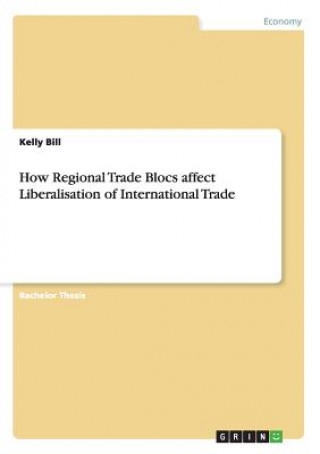
Kód: 09022726
How Regional Trade Blocs affect Liberalisation of International Trade
Autor Kelly Bill
Bachelor Thesis from the year 2011 in the subject Business economics - Trade and Distribution, grade: B+, Stanford University, language: English, abstract: A trade bloc is a preferential trade agreement between a range of nations, ... celý popis
- Jazyk:
 Angličtina
Angličtina - Vazba: Brožovaná
- Počet stran: 60
Nakladatelství: Grin Publishing, 2014
- Více informací o knize

Mohlo by se vám také líbit
-

German Report Series
1564 Kč -

Epigenetic Cancer Therapy
3516 Kč -

My Weird School Christmas 3-Book Box Set
389 Kč -

Paul Michael and the Glass Jar
562 Kč -

Des Maux d'Europe
956 Kč -

Warum stinkt der Iltis?, 1 Audio-CD
307 Kč -

Finni und Fio
751 Kč
Darujte tuto knihu ještě dnes
- Objednejte knihu a zvolte Zaslat jako dárek.
- Obratem obdržíte darovací poukaz na knihu, který můžete ihned předat obdarovanému.
- Knihu zašleme na adresu obdarovaného, o nic se nestaráte.
Více informací o knize How Regional Trade Blocs affect Liberalisation of International Trade
Nákupem získáte 138 bodů
 Anotace knihy
Anotace knihy
Bachelor Thesis from the year 2011 in the subject Business economics - Trade and Distribution, grade: B+, Stanford University, language: English, abstract: A trade bloc is a preferential trade agreement between a range of nations, aimed at significantly reducing or removing trade barriers within the member states. Regional trade blocs are formed by neighbouring countries or countries that are in close proximity to each other. The two key features of a trade bloc is that (1) it involves a cutback or abolition of obstacles to trade, and (2) the trade liberalisation that is attained through the trade bloc is discriminatory in purview of the fact that it is applicable only to the member states of the trade bloc and non-member countries are shown prejudice in their dealings with members of the trade bloc.§The first aspect of trade blocs above is in line with the mission of the World trade Organisation (WTO) and its antecedent, the General Agreement on Tariffs and Trade (GATT). The principle of Non-discrimination under the GATT stipulates that no member state shall show prejudice between GATT members during the operations of world trade. In the same magnitude, the WTO offers an environment for negotiating agreements that are focused on reducing barriers to international trade and making sure that trade is carried out on a basis of openness, thus contributing to economic growth as well as development. Notably, although trade blocs have different structures, they are premised on the same objective, that is, to lessen trade barriers among member states.§The second aspect of trade blocs however seems to be in conflict with the motive of the GATT/WTO system. The preamble of the GATT is very clear on promoting non-discrimination in international trade by reinforcing the need for reciprocal and equally advantageous arrangements focused on substantial cutbacks in tariffs and other obstacles to trade and to the abolition of discriminatory treatment in international trade. Equally, under the WTO as well as under its predecessor, the GATT, trade discrimination is promoted through the use of the principles of the Most-Favoured-Nation (MFN) that requires treatment of other people equally as pertains to trade and the principle of National Treatment which stipulates that foreigners and locals should be treated equally in trade matters.§The above overview of regional trading blocs implies that different opinions can be stated regarding how trading blocs affect liberalisation of trade. [...]
 Parametry knihy
Parametry knihy
Zařazení knihy Knihy v angličtině Economics, finance, business & management Business & management
1376 Kč
- Plný název: How Regional Trade Blocs affect Liberalisation of International Trade
- Autor: Kelly Bill
- Jazyk:
 Angličtina
Angličtina - Vazba: Brožovaná
- Počet stran: 60
- EAN: 9783656742791
- ISBN: 3656742790
- ID: 09022726
- Nakladatelství: Grin Publishing
- Hmotnost: 91 g
- Rozměry: 210 × 148 × 4 mm
- Datum vydání: 06. October 2014
Oblíbené z jiného soudku
-

Personal MBA
357 Kč -

EMPOWERED - Ordinary People, Extraordinary Products
611 Kč -

Transformed: Moving to the Product Operating Model
629 Kč -

Toyota Way, Second Edition: 14 Management Principles from the World's Greatest Manufacturer
704 Kč -

The Millionaire Real Estate Investor
543 Kč -

The Personal MBA 10th Anniversary Edition
441 Kč -

Playing with FIRE (Financial Independence Retire Early)
382 Kč -

Marketing 5.0 - Technology for Humanity
572 Kč -

Thinking In Bets
418 Kč -

The Power of Full Engagement
452 Kč -

Motive - Why So Many Leaders Abdicate Their Most Important Responsibilities
492 Kč -

4 Stages of Psychological Safety
463 Kč -

Official TOEFL iBT Tests Volume 2, Third Edition
970 Kč -

Data Privacy and GDPR Handbook
1783 Kč -

Official Guide to the TOEFL iBT Test, Sixth Edition
810 Kč -

The Hard Thing about Hard Things
597 Kč -

Karmic Management
365 Kč -

Good To Great
618 Kč -

Slight Edge
418 Kč -

The Advantage
567 Kč -

The Goal
660 Kč -

Business Model Generation - A Handbook for Visionaries Game Changers and Challengers
702 Kč -

Fundamentals of Corporate Finance
1973 Kč -

Crucial Conversations: Tools for Talking When Stakes are High, Third Edition
702 Kč -

Millionaire Real Estate Agent
530 Kč -

Business Adventures
358 Kč -

Onward
356 Kč -

Smart Women Finish Rich
375 Kč -

Thinkertoys
462 Kč -

Ready, Fire, Aim - Zero to GBP100 Million in No Time Flat
791 Kč -

Free to Choose
355 Kč -

Secrets of Power Negotiating - 25th Anniversary Edition
517 Kč -

ISE Fundamentals of Corporate Finance
1830 Kč -

Elite Sales Strategies: A Guide to Being One-Up, C reating Value, and Becoming Truly Consultative
538 Kč -

Corporate Finance
1977 Kč -

Leading Growth - The Proven Formula for Consistently Increasing Revenue
538 Kč -

Market Leader 3rd Edition Intermediate Coursebook & DVD-Rom Pack
823 Kč -

Coach's Guide to Reflective Inquiry
635 Kč -

Confidence Code
357 Kč -

Management
638 Kč -

You Can Negotiate Anything
349 Kč -

Design Thinking Toolbox - A Guide to Mastering the Most Popular and Valuable Innovation Methods
684 Kč -

The Big Book of Dashboards
962 Kč -

Death by Meeting - A Leadership Fable About Solving the Most Painful Problem in Business
520 Kč -

Business Made Simple
435 Kč -

Ride of a Lifetime
462 Kč -

Testing Business Ideas - A Field Guide for Rapid Experimentation
688 Kč -

In Search Of Excellence
286 Kč -

Outward Mindset
399 Kč
Osobní odběr Praha, Brno a 12903 dalších
Copyright ©2008-24 nejlevnejsi-knihy.cz Všechna práva vyhrazenaSoukromíCookies



 Vrácení do měsíce
Vrácení do měsíce 571 999 099 (8-15.30h)
571 999 099 (8-15.30h)